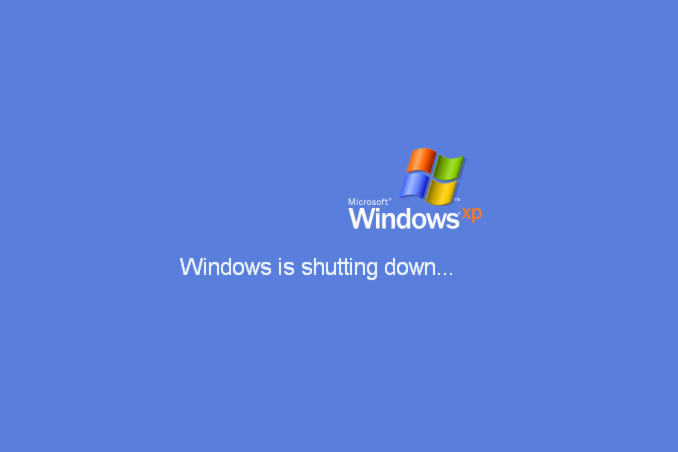Microsoft’s Windows XP Finally Dead: Last Embedded Version Reaches EOL
by Anton Shilov on April 11, 2019 11:40 AM EST- Posted in
- Operating Systems
- Windows
- Microsoft

Microsoft this week ended support for the very last Windows XP-based operating system, essentially marking the end of the platform and an era. Being one of the longest living consumer operating systems ever, Windows XP’s 'official' lifespan totaled 17 years, 7 months, and 16 days.
The software giant on April 9, 2019, ended extended support for its for Windows Embedded POSReady 2009 OS, which was the last OS based on the Windows XP with SP3. Given the name, the operating system was aimed at Point of Service embedded applications and therefore was not intended for client computers. Meanwhile, the continuous support of Windows Embedded POSReady 2009 enabled some users to receive security updates on Windows XP Home and Professional SP3-based machines through the use of a registry hack.
Microsoft’s Windows XP Home and Professional SP3 designed for client PCs reached end-of-life on April 8, 2014. The company then ceased to support its Windows Embedded for Point of Service SP3 and XP Embedded SP3 in 2016. Subsequently, Windows Embedded Standard 2009 reached EOL on January 8, 2019. Finally, it is time for Windows Embedded POSReady 2009 (released in late 2008, two years after Windows Vista) to go.
Even though Windows Embedded POSReady 2009 operating system will no longer be supported by Microsoft, many organizations and individuals will keep using it either to maintain compatibility with software or hardware applications they use (for example, manufacturing equipment made in the 1990s or the 2000s) or for other reasons. Therefore, it is safe to say that Windows XP will still be in limited use after whopping 17.5 years on the market. In fact, it should be pretty safe to use the OS on computers not connected to the Internet and not using USB drives (or other potentially insecure storage devices).
Without any doubts, Windows XP was a legend that in many ways helped to shape the PC market as we know it today and outlived at least one of its successors. Nonetheless, every legend comes to an end.
Related Reading
- A New Windows - Windows 10 Announced By Microsoft
- Microsoft Extends Skylake Support On Windows 7 And Windows 8.1
- BIOSTAR Adds Windows 7 Support To Some Intel and AMD Motherboards
- Intel Preps New H310 Chipset Revision With Windows 7 Support For Coffee Lake
Source: TechRepublic
Image Source: Medium.com










23 Comments
View All Comments
JanW1 - Friday, April 12, 2019 - link
One, Debian was not declared stable until 1996. I'd consider everything before that as a beta, but sure, make it 26 years if you want.Two, I never said it was the oldest, only cited it as an example.
lyeoh - Friday, May 17, 2019 - link
This is how I'd determine whether it's still effectively the same Desktop OS:1) Does the Debian GUI still look and work the same as it did in 1996 and not require you to retrain your staff?
2) Can you still easily use most 1996 hardware drivers on the 2019 version of Debian?
3) Can you still easily install and run the most 1996 apps (e.g. Star Office 3.1 ) on the 2019 version of Debian?
A "No" for any of these means it's not the same OS. A "Yes" in all means it's effectively the same OS or at least a very compatible OS for real world purposes.
DECwest - Friday, June 25, 2021 - link
Actually none come closer to XP lifespan, some of "LTS" OSes lifespan:RHEL 6: 10y (2010-2010 or 15y (-2025 by Oracle)
Solaris 10: 13y (2005-2018)
OS/2 Warp 4: 10y (1996-2006)
PCDOS 7: 8y (1995-2003)
FreeBSD 4: 7y (2000-2007)
Ubuntu: mostly 5y
shabby - Thursday, April 11, 2019 - link
Google should take note in os support from ms.LordSojar - Thursday, April 11, 2019 - link
I suspect some major shifts in technology in the next 10 years. We're going to see the death of the OS as a product in the next 5-6 years, the death of x86 in the next 15 years (finally). It's going to be a wild ride.Threska - Friday, April 12, 2019 - link
Never the death of consumers as cash cows. MOOOOO!Reflex - Thursday, April 11, 2019 - link
Sad day for me, I was on the kernel team for XP in 1999-2001 working on ACPI. Later I returned by joining the XP Embedded team where I was from 2006-2011. Great people, good times, sad to see it finally get the lights turned off. Huge chunk of my career.DanNeely - Thursday, April 11, 2019 - link
Does this mean any businesses still using it for their cash registers are no longer in PCI compliance?GreenReaper - Thursday, April 11, 2019 - link
Merchants must: “Ensure that all system components and software are protected from known vulnerabilities by installing applicable vendor supplied security patches. Install critical security patches within one month of release.”But maybe there are no security patches? In which case, they would not need to be installed! That said, good luck if your insurance requires PCI compliance and you get hit by a known vulnerability
abhaxus - Saturday, April 13, 2019 - link
As someone who works for a major POS vendor, the vast majority of posready devices still out there aren't connected to the internet. Legacy software on private internal networks.